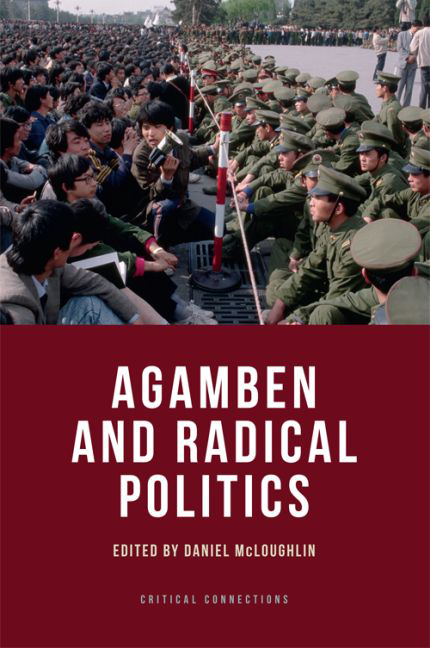Book contents
- Frontmatter
- Contents
- Acknowledgements
- Introduction: Agamben and Radical Politics
- 1 Capitalism as Religion
- 2 Glory, Spectacle and Inoperativity: Agamben's Praxis of Theoria
- 3 On Property and the Philosophy of Poverty: Agamben and Anarchism
- 4 ‘Man Produces Universally’: Praxis and Production in Agamben and Marx
- 5 Liturgical Labour: Agamben on the Post-Fordist Spectacle
- 6 An Alogical Space of Genetic Reintrication: Notes on an Element of Giorgio Agamben's Method
- 7 Zoē aiōniōs: Giorgio Agamben and the Critique of Katechontic Time
- 8 Agamben, Badiou and Affirmative Biopolitics
- 9 Form-of-Life and Antagonism: On Homo Sacer and Operaismo
- 10 What Is a Form-of-Life?: Giorgio Agamben and the Practice of Poverty
- 11 Law and Life beyond Incorporation: Agamben, Highest Poverty and the Papal Legal Revolution
- Notes on Contributors
- Index
3 - On Property and the Philosophy of Poverty: Agamben and Anarchism
Published online by Cambridge University Press: 23 September 2017
- Frontmatter
- Contents
- Acknowledgements
- Introduction: Agamben and Radical Politics
- 1 Capitalism as Religion
- 2 Glory, Spectacle and Inoperativity: Agamben's Praxis of Theoria
- 3 On Property and the Philosophy of Poverty: Agamben and Anarchism
- 4 ‘Man Produces Universally’: Praxis and Production in Agamben and Marx
- 5 Liturgical Labour: Agamben on the Post-Fordist Spectacle
- 6 An Alogical Space of Genetic Reintrication: Notes on an Element of Giorgio Agamben's Method
- 7 Zoē aiōniōs: Giorgio Agamben and the Critique of Katechontic Time
- 8 Agamben, Badiou and Affirmative Biopolitics
- 9 Form-of-Life and Antagonism: On Homo Sacer and Operaismo
- 10 What Is a Form-of-Life?: Giorgio Agamben and the Practice of Poverty
- 11 Law and Life beyond Incorporation: Agamben, Highest Poverty and the Papal Legal Revolution
- Notes on Contributors
- Index
Summary
Despite his interest in a non-sovereign and anomial politics, Agamben makes scant reference to thinkers in the anarchist tradition. However, particularly with the turn to questions of government and economy in his latest works, he delves increasingly into themes at the heart of anarchist philosophy: the renunciation of property and the practice of poverty as a means of living outside of determination by law and state; the negative and positive moments of transformation variously associated with revolt or revolution; the ‘idea of communism’ and the figure of ‘the Ungovernable’. It is noteworthy how, at the point in The Time That Remains where he first explicitly references anarchist theory, Agamben identifies in Max Stirner an ‘ethical-anarchic interpretation of the Pauline as not’. While this reference to anarchist theory is brief, it nonetheless suggests that anarchism is important to understanding Agamben's account of the ‘coming politics’. That he refers to the anarchist tradition in the wider context of a discussion of Marxist thought concerning the ‘messianic’ vocation of the proletariat class and Marx's ‘ridiculing’ of the anarchic egoism of Stirner, invites reflection on Agamben's relation to anarchism and to Marxism. In this chapter I explore these connections in the context of the ideological conflict that strained relations between Marx and the anarchists, and ultimately resulted in the collapse of the First International Workingmen's Association in 1872.
For Agamben, ‘philosophical archaeology’ returns thought to an unstable moment, manifestly past, in order to apply its methodological pressure: recovering the productive potential of the uncertainty that was lost when the crisis passed resolutely into history; reinvesting this potential with a redemptive power to transform radical thought and practice in its current responses to contemporary configurations of power and economy. In an ‘archaeology’ of radical thought in the Western political tradition, the First International stands as a flashpoint where internal conflicts gave rise to selectively victorious strategies with significant historical effects. These include the dominance within the Left of the Marxist paradigm of historical materialism; the perceived failure of communism with the eventual collapse of the Soviet Union; and, hence, the spectacular hegemony of late capitalism that has become our inheritance.
- Type
- Chapter
- Information
- Agamben and Radical Politics , pp. 49 - 70Publisher: Edinburgh University PressPrint publication year: 2016



